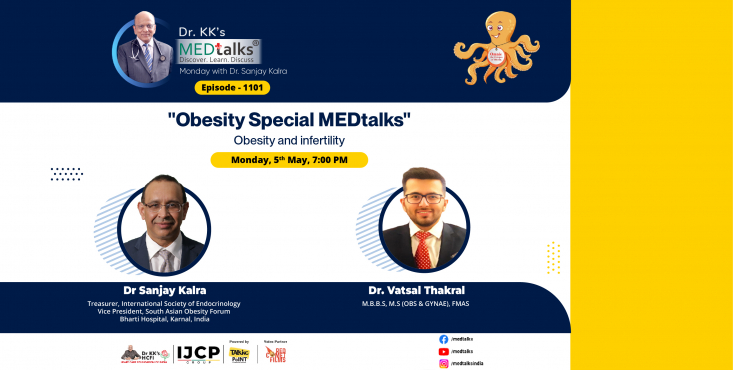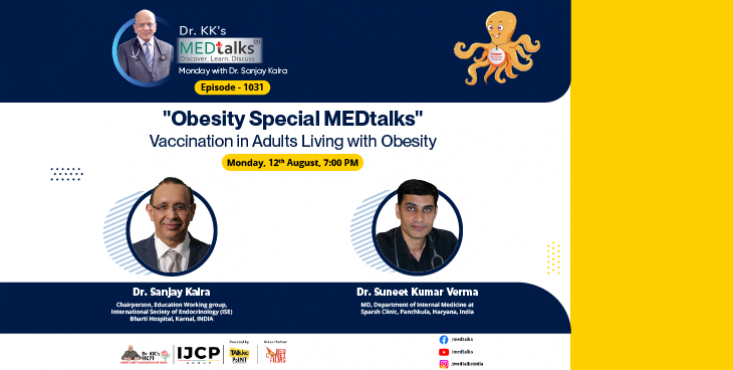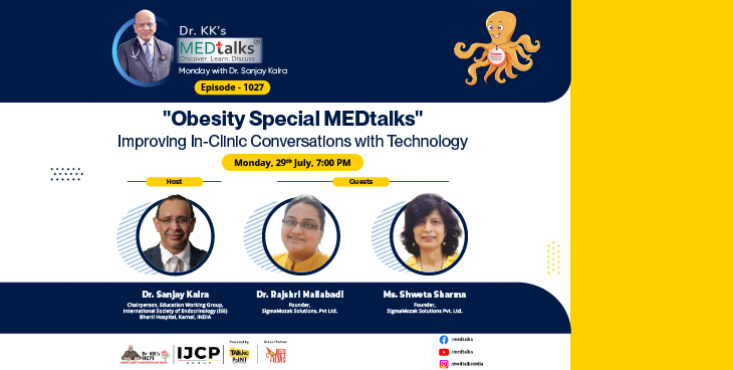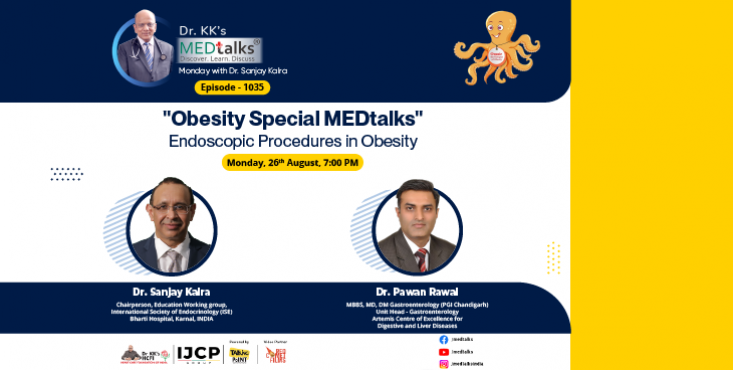Happy Hormones - The pineal gland-The third eye
1825 views
Streamed on 18 Aug, 2025, 07:00 PM
ABOUT THIS SESSION
In the first session of the Happy Hormones series, Dr. Sanjay Kalra will explore the fascinating role of the pineal gland, often referred to as the "third eye." Though small in size, this gland plays a vital part in regulating sleep, mood, and circadian rhythms through melatonin secretion. Blending ancient symbolism with modern science, Dr. Kalra will shed light on how the pineal gland influences both health and well-being.
Q&A
Serotonin, dopamine, oxytocin, and endorphins are called happy hormones because they regulate mood, reward, bonding, and stress resilience, all of which influence emotional, mental, and physical well-being.
Hormones are central to neuroendocrine regulation, linking the brain, glands, and body. Balanced secretion supports emotional stability, immunity, and cardiovascular and metabolic health.
Serotonin regulates mood, appetite, and circadian rhythm. Low level of serotonin is associated with depression and anxiety, making it essential for emotional balance.
Dopamine is known to drive motivation, reward, and learning. Dysregulation of dopamine levels plays a key role in developing addictive behaviors and psychiatric disorders, highlighting its importance in adaptive behavior.
Oxytocin, secreted by the hypothalamus and pituitary, helps facilitate trust, empathy, and maternal behaviors, earning it the title 'love hormone.'
Endorphins are endogenous opioids that modulate pain and stress. Their release during exercise or laughter induces euphoria and natural analgesia.
The brain-pituitary axis and peripheral glands, such as adrenal glands and gut enterochromaffin cells, play a critical role in hormone secretion and balance.
Yes. Exercise, sleep, sunlight exposure, social interaction, and balanced nutrition enhance secretion, while chronic stress and poor lifestyle reduce it.
Stress elevates cortisol, which suppresses serotonin and dopamine, reducing resilience and increasing risk of mood disorders.
Yes, therapies may include antidepressants (SSRIs), lifestyle interventions, or hormone-modulating treatments under medical supervision.
FACULTY

Dr. Sanjay Kalra
Consultant & Head,Treasurer, International Society of Endocrinology (ISE), Vice President, South Asian Obesity Forum (SOF) Bharti Hospital, Karnal, Haryana, India
MORE FROM PRACTICE MANAGEMENT
slot pulsa
akang69
akang69
slot pulsa
slot pulsa
https://chateraise.org/menu/
slot gacor
kanjeng69
https://www.seansprimedining.com/dine
slot gacor
slot demo
akang69
slot gacor
slot pulsa
slot pulsa
akang69
https://valentinesdaycountdown.com/
slot jepang
slot gacor
slot gacor
slot88
slot gacor
slot gacor
akang69
akang69
akang69
akang69
slot gacor
slot gacor
slot gacor
https://www.alpinecafeandbakery.com/menu.html
https://applebeesmenu.us/applebees-lunch-menu/
https://bakeryandsweets-fest.com/product-highlight/
https://sevenseassushi.com/menu/
slot gacor
slot777
https://freakout.club/
slot gacor
slot gacor
https://rsgm.moestopo.ac.id/instalasi-rawat-jalan/
slot gacor
slot pulsa
slot gacor
slot gacor
http://www.motohom.co.in/
slot pulsa
https://intervencion.uahurtado.cl/
slot pulsa
slot pulsa
https://www.kp2.it.maranatha.edu/
slot gacor
slot gacor
mahjong ways
slot gacor
https://azure3.test.utah.edu/
https://iceam.unimap.edu.my/
https://sindika.co.id/contact/
slot gacor
slot gacor
slot pulsa
https://jhep.unimap.edu.my/
slot gacor
Kartu Pokémon Naik Harga!! Penghobi Naik Drastis, Bermain No Limit Dapat Cuan Berlimpah
Resep Putar Hemat WD Paus di Sugar Rush, Murah Namun Ampuh!
Seseorang Terlihat Jauh Lebih Muda dari Usianya, 7 Game Big Bass Crash yang Menguntungkan
Tukang Bubur Demi Beli Honda Megapro Terbaru, Main PGSoft di Kanjeng Jadi Jutawan!
slot gacor
slot pulsa
https://portal.kaafuni.edu.gh/
https://www.thedeenshow.com/
https://elektro.trunojoyo.ac.id/
https://pgsd.trunojoyo.ac.id/
http://www.gmci.in/
https://www.medigunakhisar.com/contact/
https://www.medigunakhisar.com/category/doktorlar/
https://www.medigunakhisar.com/about/
https://www.oscarstores.com/
https://ritalabailaora.com/
https://journal.stiepertiba.ac.id/official/
https://shopifyvps.trackship.co/
https://krandeganbayan.id/
https://www.imik.edu.in/
https://www.natasshaselvaraj.com/
http://ebphtb.banjarnegarakab.go.id/
https://bigbiteonpitt.com.au/
https://sigen.kaltimprov.go.id/
http://rju.parco.gov.ba/
https://samajpragatisahayog.org/
https://bendismea.be.gov.ng/
https://mozaiktravel.id/
https://xm42newdev.wpengine.com/
https://epr.rw/
https://tribelio.page/slotpulsa
https://mhs.akpertgkfakinah.ac.id/
http://lms6.digivarsity.com/
https://ssr.vinayakamission.com/
https://prelnor.molg.go.ug/gallery/
https://englishfocus.upstegal.ac.id/
akang69
https://virtex.canadianminingexpo.com/
slot pulsa
slot bet 200
slot online
convocation.aiou.edu.pk/
https://qna.bpsaceh.com/
https://storage.therapyrooms.com/
https://www.inaexport.id/
https://vmrfdu.edu.in/
https://www.jniemann.it/
https://katalog.intanonline.com/view/
akang69
akang69
akang69
https://affordableadsgroup.com/
https://doktor.fisip.hangtuah.ac.id/
https://um.originmena.com/
https://primemarkets.com.sa/branches
https://primemarkets.com.sa/
https://www.aqtiverse.in/images/
slot gacor
https://rokomarifood.com/
https://beritrust.com/
https://dispora.sumbarprov.go.id/imgs/
slot pulsa
http://pubma.edostate.gov.ng/
https://palermo.if.ua/
akang69
slot qris
http://husc.hueuni.edu.vn/
https://www.grupogasca.com/
slot pulsa
https://ukm.stiedharmaputra-smg.ac.id/
https://ppid.mukomukokab.go.id/
slot gacor
https://s1cs.stmikroyal.ac.id/
https://terlaksana.co.id/img/
slot pulsa
https://graduation.sjctni.edu/SJCGRAD24/abc_id.php
https://admission.sjctni.edu/
https://camarabonitodeminas.mg.gov.br/oficios/
https://kmob.jabarprov.go.id/
https://ssm.school.ssmetrust.in/
https://cjnc.ppnijateng.org/
https://paisaje.age-geografia.es/
slot pulsa
hasilwin
demototo
http://majaslapa.lv/media/
slot gacor
https://sumpah.ppnijateng.org/
https://www.uniabuja.edu.ng/
https://training.super5.org/
slot pulsa
slot gacor
https://mmi.edu.pk/find-a-doctor/
https://lonsuit.unismuhluwuk.ac.id/
slot pulsa
slot gacor
https://taxicarudaipur.com/
slot pulsa
slot gacor
slot gacor
slot gacor
slot pulsa
https://siraberu.mixh.jp/
slot gacor
slot pulsa
slot gacor
https://hkg.methodist.org.hk/
slot gacor
https://www.asopa.org/
https://fisip.unismuhluwuk.ac.id/
slot gacor
https://www.panganku.org/id-ID/semua_nutrisi
https://ejurnal.ikippgribojonegoro.ac.id/
slot gacor
https://katalog.intanonline.com/view/
https://stikesgrahaedukasi.ac.id/
https://kec.slogohimo.wonogirikab.go.id/
https://www.facesulavirtual.net/efaces/
https://www.gratisongkir.id/
https://bukupdpi.klikpdpi.com/
https://ilp.mizoram.gov.in/
https://www.campdoha.org/
slot gacor
slot gacor
https://katalog.intanonline.com/
slot gacor
https://munabarat.go.id/index.php
https://youtube.klikpdpi.com/
https://katalog.intanonline.com/lazada.IM.im-msgbox
https://understandquran.com/
https://youtube.klikpdpi.com/
https://gratisongkir.id/console/
https://gratisongkir.id/vagrant/
https://www.gratisongkir.id/uploads/
https://www.gratisongkir.id/assets/
https://snyderfamilyband.com/
https://handholding.mizoram.gov.in/
https://dconline.mizoram.gov.in/
https://siva.umkendari.ac.id/
https://www.gthlcanada.com/
https://www.gratisongkir.id/assets/
https://www.vidyasthalilawcollege.com/
togel toto
slot gacor
https://www.facesulavirtual.net/
hasilwin
https://amertamedia.co.id/
https://www.gulfstarsauto.com/
https://aptika.id/
https://www.bytestechnolab.com/
slot gacor
slot deposit 10k
slot singapore
slot thailand
AKANG69
AKANG69
https://snyderfamilyband.com/
slot gacor
https://epaper.notunshomoy.com/
https://development.upr.ac.id/
https://fornas.kebijakankesehatanindonesia.net/
slot gacor
slot pulsa
https://e-anatolh.com/
slot gacor
slot thailand
slot pulsa
kanjeng69
https://loudhelp.com/
slot thailand
https://ipss-addis.org/
slot gacor
https://engineering.upstegal.ac.id/
slot gacor
https://sipaksi.unpak.ac.id/
https://pbi.teknik.unmuha.ac.id/
https://bkd.inkhas.ac.id/files/
https://barcode.akbidyahmi.ac.id/
https://sdcirebonislamic.cerdig.com/
https://tilganga.org/
https://siperjaka.ms-langsa.go.id/
slot pulsa
https://dinsos.bekasikab.go.id/
https://stkq.alhikamdepok.ac.id/
http://fmipa.upr.ac.id/
https://beasiswaperintis.id/
slot pulsa
slot pulsa
https://www.thebestflushingtoilet.com/
https://sdiassalaftahfidzulquran.cerdig.com/
https://sv-388.asia/
https://lppm.upr.ac.id/
https://peraturan.upr.ac.id/
https://simpeg-tb.id/
https://contentacademy.id/
https://ws-168.org/
slot pulsa
https://simpeg-tb.id/
https://www.lagrangepointsbrussels.com/
https://admisi.uinsaid.ac.id/img/
slot gatot kaca
https://www.multimarcasgrupovianorte.com.br/
https://silajara.kepulauanselayarkab.go.id/
slot pulsa
https://bapenda.batubarakab.go.id/run/
https://dosen.billfath.ac.id/sites/
gatot kaca slot
http://sibkd.semarangkab.go.id/ekgb/temp/
http://jak.faperta.unand.ac.id/sites/
slot pulsa
slot kamboja
https://dinsos.bekasikab.go.id/yasha/
http://agribisnis.faperta.unand.ac.id/
https://hondayogyakarta.id/
http://jak.faperta.unand.ac.id/sites/
https://dinsos.bekasikab.go.id/hunt/
https://dinsos.bekasikab.go.id/dagger/
http://tanah.faperta.unand.ac.id/potion/
https://dinsos.bekasikab.go.id/dagon/
https://dinsos.bekasikab.go.id/potion/
https://tourism.lgu-santol.gov.ph/
https://fdik.uinmataram.ac.id/rune/
https://v2.poltekpelni.ac.id/fiend/
https://simbada.kalbarprov.go.id/
https://slotpulsa2025.net/
https://slotindosat.net/
https://www.scootersforknee.com/
http://sibkd.semarangkab.go.id/sib/excel/
https://www.worldminner.com/
slot gacor
https://literate.nusaputra.ac.id/lib/
https://potomacofficersclub.com/wp-content/cache/
https://literate.nusaputra.ac.id/docs/
https://literate.nusaputra.ac.id/api/
https://www.idecesar.gov.co/images/
http://sim-epk.poltekkes-medan.ac.id/
http://sibkd.semarangkab.go.id/kartukorpri/pages/
http://sibkd.semarangkab.go.id/kartukorpri/pages/
https://buycapybara.com/
https://desasungaibuluhungar.id/
https://pgmi.unupurwokerto.ac.id/slotzeus/
https://pgmi.unupurwokerto.ac.id/slotthailand/
slot dana
https://admissions.kmtc.ac.ke/
https://permana.upstegal.ac.id/run/
https://permana.upstegal.ac.id/pages/run/
https://stkq2.alhikamdepok.ac.id/
slot pulsa
https://www.allnursejobdescriptions.com/
https://mbkm.uim.ac.id/wp-includes/images/
https://tinjukosimaling.baritotimurkab.go.id/
https://www.silenteye.org/
slot pulsa
https://upscpdf.com/img/
https://keusatker.badilag.net/file_import/
https://bisnis.poltekkesdepkes-sby.ac.id/wp-content/
Slot Bca
Slot Qris
Scatter Hitam
Slot Thailand
Slot Qris
Slot Thailand
Slot gacor
Slot pulsa
Slot zeus
Slot zeus
https://bisnis.poltekkesdepkes-sby.ac.id/wp-content/
https://gresikunited.com/run/
slot gacor
https://pusppm.poltekkesdepkes-sby.ac.id/file/
https://gameplayterbaru.com/
deposit pulsa indosat
https://jdih.tubankab.go.id/js/
https://jdih.tubankab.go.id/library/
https://jdih.tubankab.go.id/img/
https://jdih.tubankab.go.id/gallery/
slot thailand
https://epanel.cblu.ac.in/-/
http://bjkang14.postech.ac.kr/wordpress/
http://bjkang14.postech.ac.kr/wp-includes/assets/
http://bjkang14.postech.ac.kr/wp-includes/images/
https://arktisdesign.com/
https://www.allnursejobdescriptions.com/
https://ziare-online.com/
slot gacor
https://e-jazirah.com/
slot qris
https://www.ultimatepethub.com/
https://slotovo2025.com/
https://www.mobeyday.com/
https://staipati.ac.id/
scatter hitam
slot thailand
scatter hitam
akang69
akang69
akang69
slot qris
slot dana
mahjong ways 3
mahjong wins 3
https://assignmenthacks.com/
Slot Pulsa
Slot pulsa
Slot pulsa
https://acehpos.id/
https://archerysportsindia.com/
https://mrsavnpolytechnic.com/
https://nandanavanamorganics.com/
https://leeupvcsolutions.com/
https://lelaskinclinic.com/
slot thailand
https://thebharatschool.com/
https://mealsandmilemarkers.com/
https://ecustomssecure.com/
https://wallstreetenglish.edu.mm/
https://audio-constructor.com/
https://www.pulsaaxis.net/
https://www.akangseru.com/
https://ukrainemarriageguide.com/
akang69
https://www.akangseru.com/
https://catalinaislandbrewhouse.com/
slot shopeepay
slot shopeepay
10 situs togel
https://captionstore.com/
https://gettranslate.org/
https://terrariumtvultimate.com/
https://www.pryorok.com/
https://saralgyaan.com/
https://ginghameats.com/
slot shopeepay
https://gettranslate.org/
https://captionstore.com
https://enjoyislamabad.com
https://waveites.com
https://voicenusantara.id/
https://mmabreakdown.com/
https://bobmccoyart.com/
https://perpusdajawatengah.id/
https://ziggyoficialbr.com/
slot pulsa
https://linkr.bio/akang69/
https://dev.cfar.org/
https://saveursdailleurs.net/
https://joy.link/akang69
https://ponpesmodernal-imantebelian.ponpes.id/sites/
http://themockingbirdkc.com
http://akang699.kesug.com/
http://akang69.rf.gd/
https://www.ongrace.com/
https://my-home-zen-spa.com/
https://cebofil.org/
http://ironwooddesignstudio.com
https://cebofil.org/
https://pulsa-akang69.tumblr.com/
https://bandar-akang69.tumblr.com/
https://akang69daftar.tumblr.com/
https://sikelor.parigimoutongkab.go.id/vendor/agen-pulsa/
https://www.deviantart.com/slot-gacor-akang69/about
https://www.yuswohady.com/
https://indonesiaindustryoutlook.com/
https://bikeindex.org/users/akang69
https://rivielle.com/
https://issuu.com/akang69
https://heylink.me/akang69z
https://graphicography.id/slotbca/
http://oyannews.com/az/slotdemo/
https://www.laser-travel.com.np/
https://sim-epk.poltekkesjogja.ac.id/slotpulsa/
https://uddoktahoi.com/
http://www.lightcodes.net/
https://wave-gate.lightcodes.net/
https://pohwates-bjn.desa.id/slotdepo/
https://zabava.bluespot.hr/
https://bluespot.hr/
https://www.thethingsnetwork.org/u/akang69/
https://bikeindex.org/users/akang69/
https://www.masterassignment.com/
https://getyourexamdone.com/
https://www.penzion-miromar.cz/
https://sardogs.net/
https://king-lbent.com/
https://lamstyle.com/
https://pulsaindosat.us.com/
https://pulsaindosat.eu.com/
https://pulsaindosat.uk.com/
https://tamilmv.ws/
https://slotindosatt.com/
akang69
akang69
slot pulsa
slot pulsa
https://chateraise.org/menu/
slot gacor
kanjeng69
https://www.seansprimedining.com/dine
slot gacor
slot demo
akang69
slot gacor
slot pulsa
slot pulsa
akang69
https://valentinesdaycountdown.com/
slot jepang
slot gacor
slot gacor
slot88
slot gacor
slot gacor
akang69
akang69
akang69
akang69
slot gacor
slot gacor
slot gacor
https://www.alpinecafeandbakery.com/menu.html
https://applebeesmenu.us/applebees-lunch-menu/
https://bakeryandsweets-fest.com/product-highlight/
https://sevenseassushi.com/menu/
slot gacor
slot777
https://freakout.club/
slot gacor
slot gacor
https://rsgm.moestopo.ac.id/instalasi-rawat-jalan/
slot gacor
slot pulsa
slot gacor
slot gacor
http://www.motohom.co.in/
slot pulsa
https://intervencion.uahurtado.cl/
slot pulsa
slot pulsa
https://www.kp2.it.maranatha.edu/
slot gacor
slot gacor
mahjong ways
slot gacor
https://azure3.test.utah.edu/
https://iceam.unimap.edu.my/
https://sindika.co.id/contact/
slot gacor
slot gacor
slot pulsa
https://jhep.unimap.edu.my/
slot gacor
Kartu Pokémon Naik Harga!! Penghobi Naik Drastis, Bermain No Limit Dapat Cuan Berlimpah
Resep Putar Hemat WD Paus di Sugar Rush, Murah Namun Ampuh!
Seseorang Terlihat Jauh Lebih Muda dari Usianya, 7 Game Big Bass Crash yang Menguntungkan
Tukang Bubur Demi Beli Honda Megapro Terbaru, Main PGSoft di Kanjeng Jadi Jutawan!
slot gacor
slot pulsa
https://portal.kaafuni.edu.gh/
https://www.thedeenshow.com/
https://elektro.trunojoyo.ac.id/
https://pgsd.trunojoyo.ac.id/
http://www.gmci.in/
https://www.medigunakhisar.com/contact/
https://www.medigunakhisar.com/category/doktorlar/
https://www.medigunakhisar.com/about/
https://www.oscarstores.com/
https://ritalabailaora.com/
https://journal.stiepertiba.ac.id/official/
https://shopifyvps.trackship.co/
https://krandeganbayan.id/
https://www.imik.edu.in/
https://www.natasshaselvaraj.com/
http://ebphtb.banjarnegarakab.go.id/
https://bigbiteonpitt.com.au/
https://sigen.kaltimprov.go.id/
http://rju.parco.gov.ba/
https://samajpragatisahayog.org/
https://bendismea.be.gov.ng/
https://mozaiktravel.id/
https://xm42newdev.wpengine.com/
https://epr.rw/
https://tribelio.page/slotpulsa
https://mhs.akpertgkfakinah.ac.id/
http://lms6.digivarsity.com/
https://ssr.vinayakamission.com/
https://prelnor.molg.go.ug/gallery/
https://englishfocus.upstegal.ac.id/
akang69
https://virtex.canadianminingexpo.com/
slot pulsa
slot bet 200
slot online
convocation.aiou.edu.pk/
https://qna.bpsaceh.com/
https://storage.therapyrooms.com/
https://www.inaexport.id/
https://vmrfdu.edu.in/
https://www.jniemann.it/
https://katalog.intanonline.com/view/
akang69
akang69
akang69
https://affordableadsgroup.com/
https://doktor.fisip.hangtuah.ac.id/
https://um.originmena.com/
https://primemarkets.com.sa/branches
https://primemarkets.com.sa/
https://www.aqtiverse.in/images/
slot gacor
https://rokomarifood.com/
https://beritrust.com/
https://dispora.sumbarprov.go.id/imgs/
slot pulsa
http://pubma.edostate.gov.ng/
https://palermo.if.ua/
akang69
slot qris
http://husc.hueuni.edu.vn/
https://www.grupogasca.com/
slot pulsa
https://ukm.stiedharmaputra-smg.ac.id/
https://ppid.mukomukokab.go.id/
slot gacor
https://s1cs.stmikroyal.ac.id/
https://terlaksana.co.id/img/
slot pulsa
https://graduation.sjctni.edu/SJCGRAD24/abc_id.php
https://admission.sjctni.edu/
https://camarabonitodeminas.mg.gov.br/oficios/
https://kmob.jabarprov.go.id/
https://ssm.school.ssmetrust.in/
https://cjnc.ppnijateng.org/
https://paisaje.age-geografia.es/
slot pulsa
hasilwin
demototo
http://majaslapa.lv/media/
slot gacor
https://sumpah.ppnijateng.org/
https://www.uniabuja.edu.ng/
https://training.super5.org/
slot pulsa
slot gacor
https://mmi.edu.pk/find-a-doctor/
https://lonsuit.unismuhluwuk.ac.id/
slot pulsa
slot gacor
https://taxicarudaipur.com/
slot pulsa
slot gacor
slot gacor
slot gacor
slot pulsa
https://siraberu.mixh.jp/
slot gacor
slot pulsa
slot gacor
https://hkg.methodist.org.hk/
slot gacor
https://www.asopa.org/
https://fisip.unismuhluwuk.ac.id/
slot gacor
https://www.panganku.org/id-ID/semua_nutrisi
https://ejurnal.ikippgribojonegoro.ac.id/
slot gacor
https://katalog.intanonline.com/view/
https://stikesgrahaedukasi.ac.id/
https://kec.slogohimo.wonogirikab.go.id/
https://www.facesulavirtual.net/efaces/
https://www.gratisongkir.id/
https://bukupdpi.klikpdpi.com/
https://ilp.mizoram.gov.in/
https://www.campdoha.org/
slot gacor
slot gacor
https://katalog.intanonline.com/
slot gacor
https://munabarat.go.id/index.php
https://youtube.klikpdpi.com/
https://katalog.intanonline.com/lazada.IM.im-msgbox
https://understandquran.com/
https://youtube.klikpdpi.com/
https://gratisongkir.id/console/
https://gratisongkir.id/vagrant/
https://www.gratisongkir.id/uploads/
https://www.gratisongkir.id/assets/
https://snyderfamilyband.com/
https://handholding.mizoram.gov.in/
https://dconline.mizoram.gov.in/
https://siva.umkendari.ac.id/
https://www.gthlcanada.com/
https://www.gratisongkir.id/assets/
https://www.vidyasthalilawcollege.com/
togel toto
slot gacor
https://www.facesulavirtual.net/
hasilwin
https://amertamedia.co.id/
https://www.gulfstarsauto.com/
https://aptika.id/
https://www.bytestechnolab.com/
slot gacor
slot deposit 10k
slot singapore
slot thailand
AKANG69
AKANG69
https://snyderfamilyband.com/
slot gacor
https://epaper.notunshomoy.com/
https://development.upr.ac.id/
https://fornas.kebijakankesehatanindonesia.net/
slot gacor
slot pulsa
https://e-anatolh.com/
slot gacor
slot thailand
slot pulsa
kanjeng69
https://loudhelp.com/
slot thailand
https://ipss-addis.org/
slot gacor
https://engineering.upstegal.ac.id/
slot gacor
https://sipaksi.unpak.ac.id/
https://pbi.teknik.unmuha.ac.id/
https://bkd.inkhas.ac.id/files/
https://barcode.akbidyahmi.ac.id/
https://sdcirebonislamic.cerdig.com/
https://tilganga.org/
https://siperjaka.ms-langsa.go.id/
slot pulsa
https://dinsos.bekasikab.go.id/
https://stkq.alhikamdepok.ac.id/
http://fmipa.upr.ac.id/
https://beasiswaperintis.id/
slot pulsa
slot pulsa
https://www.thebestflushingtoilet.com/
https://sdiassalaftahfidzulquran.cerdig.com/
https://sv-388.asia/
https://lppm.upr.ac.id/
https://peraturan.upr.ac.id/
https://simpeg-tb.id/
https://contentacademy.id/
https://ws-168.org/
slot pulsa
https://simpeg-tb.id/
https://www.lagrangepointsbrussels.com/
https://admisi.uinsaid.ac.id/img/
slot gatot kaca
https://www.multimarcasgrupovianorte.com.br/
https://silajara.kepulauanselayarkab.go.id/
slot pulsa
https://bapenda.batubarakab.go.id/run/
https://dosen.billfath.ac.id/sites/
gatot kaca slot
http://sibkd.semarangkab.go.id/ekgb/temp/
http://jak.faperta.unand.ac.id/sites/
slot pulsa
slot kamboja
https://dinsos.bekasikab.go.id/yasha/
http://agribisnis.faperta.unand.ac.id/
https://hondayogyakarta.id/
http://jak.faperta.unand.ac.id/sites/
https://dinsos.bekasikab.go.id/hunt/
https://dinsos.bekasikab.go.id/dagger/
http://tanah.faperta.unand.ac.id/potion/
https://dinsos.bekasikab.go.id/dagon/
https://dinsos.bekasikab.go.id/potion/
https://tourism.lgu-santol.gov.ph/
https://fdik.uinmataram.ac.id/rune/
https://v2.poltekpelni.ac.id/fiend/
https://simbada.kalbarprov.go.id/
https://slotpulsa2025.net/
https://slotindosat.net/
https://www.scootersforknee.com/
http://sibkd.semarangkab.go.id/sib/excel/
https://www.worldminner.com/
slot gacor
https://literate.nusaputra.ac.id/lib/
https://potomacofficersclub.com/wp-content/cache/
https://literate.nusaputra.ac.id/docs/
https://literate.nusaputra.ac.id/api/
https://www.idecesar.gov.co/images/
http://sim-epk.poltekkes-medan.ac.id/
http://sibkd.semarangkab.go.id/kartukorpri/pages/
http://sibkd.semarangkab.go.id/kartukorpri/pages/
https://buycapybara.com/
https://desasungaibuluhungar.id/
https://pgmi.unupurwokerto.ac.id/slotzeus/
https://pgmi.unupurwokerto.ac.id/slotthailand/
slot dana
https://admissions.kmtc.ac.ke/
https://permana.upstegal.ac.id/run/
https://permana.upstegal.ac.id/pages/run/
https://stkq2.alhikamdepok.ac.id/
slot pulsa
https://www.allnursejobdescriptions.com/
https://mbkm.uim.ac.id/wp-includes/images/
https://tinjukosimaling.baritotimurkab.go.id/
https://www.silenteye.org/
slot pulsa
https://upscpdf.com/img/
https://keusatker.badilag.net/file_import/
https://bisnis.poltekkesdepkes-sby.ac.id/wp-content/
Slot Bca
Slot Qris
Scatter Hitam
Slot Thailand
Slot Qris
Slot Thailand
Slot gacor
Slot pulsa
Slot zeus
Slot zeus
https://bisnis.poltekkesdepkes-sby.ac.id/wp-content/
https://gresikunited.com/run/
slot gacor
https://pusppm.poltekkesdepkes-sby.ac.id/file/
https://gameplayterbaru.com/
deposit pulsa indosat
https://jdih.tubankab.go.id/js/
https://jdih.tubankab.go.id/library/
https://jdih.tubankab.go.id/img/
https://jdih.tubankab.go.id/gallery/
slot thailand
https://epanel.cblu.ac.in/-/
http://bjkang14.postech.ac.kr/wordpress/
http://bjkang14.postech.ac.kr/wp-includes/assets/
http://bjkang14.postech.ac.kr/wp-includes/images/
https://arktisdesign.com/
https://www.allnursejobdescriptions.com/
https://ziare-online.com/
slot gacor
https://e-jazirah.com/
slot qris
https://www.ultimatepethub.com/
https://slotovo2025.com/
https://www.mobeyday.com/
https://staipati.ac.id/
scatter hitam
slot thailand
scatter hitam
akang69
akang69
akang69
slot qris
slot dana
mahjong ways 3
mahjong wins 3
https://assignmenthacks.com/
Slot Pulsa
Slot pulsa
Slot pulsa
https://acehpos.id/
https://archerysportsindia.com/
https://mrsavnpolytechnic.com/
https://nandanavanamorganics.com/
https://leeupvcsolutions.com/
https://lelaskinclinic.com/
slot thailand
https://thebharatschool.com/
https://mealsandmilemarkers.com/
https://ecustomssecure.com/
https://wallstreetenglish.edu.mm/
https://audio-constructor.com/
https://www.pulsaaxis.net/
https://www.akangseru.com/
https://ukrainemarriageguide.com/
akang69
https://www.akangseru.com/
https://catalinaislandbrewhouse.com/
slot shopeepay
slot shopeepay
10 situs togel
https://captionstore.com/
https://gettranslate.org/
https://terrariumtvultimate.com/
https://www.pryorok.com/
https://saralgyaan.com/
https://ginghameats.com/
slot shopeepay
https://gettranslate.org/
https://captionstore.com
https://enjoyislamabad.com
https://waveites.com
https://voicenusantara.id/
https://mmabreakdown.com/
https://bobmccoyart.com/
https://perpusdajawatengah.id/
https://ziggyoficialbr.com/
slot pulsa
https://linkr.bio/akang69/
https://dev.cfar.org/
https://saveursdailleurs.net/
https://joy.link/akang69
https://ponpesmodernal-imantebelian.ponpes.id/sites/
http://themockingbirdkc.com
http://akang699.kesug.com/
http://akang69.rf.gd/
https://www.ongrace.com/
https://my-home-zen-spa.com/
https://cebofil.org/
http://ironwooddesignstudio.com
https://cebofil.org/
https://pulsa-akang69.tumblr.com/
https://bandar-akang69.tumblr.com/
https://akang69daftar.tumblr.com/
https://sikelor.parigimoutongkab.go.id/vendor/agen-pulsa/
https://www.deviantart.com/slot-gacor-akang69/about
https://www.yuswohady.com/
https://indonesiaindustryoutlook.com/
https://bikeindex.org/users/akang69
https://rivielle.com/
https://issuu.com/akang69
https://heylink.me/akang69z
https://graphicography.id/slotbca/
http://oyannews.com/az/slotdemo/
https://www.laser-travel.com.np/
https://sim-epk.poltekkesjogja.ac.id/slotpulsa/
https://uddoktahoi.com/
http://www.lightcodes.net/
https://wave-gate.lightcodes.net/
https://pohwates-bjn.desa.id/slotdepo/
https://zabava.bluespot.hr/
https://bluespot.hr/
https://www.thethingsnetwork.org/u/akang69/
https://bikeindex.org/users/akang69/
https://www.masterassignment.com/
https://getyourexamdone.com/
https://www.penzion-miromar.cz/
https://sardogs.net/
https://king-lbent.com/
https://lamstyle.com/
https://pulsaindosat.us.com/
https://pulsaindosat.eu.com/
https://pulsaindosat.uk.com/
https://tamilmv.ws/
https://slotindosatt.com/

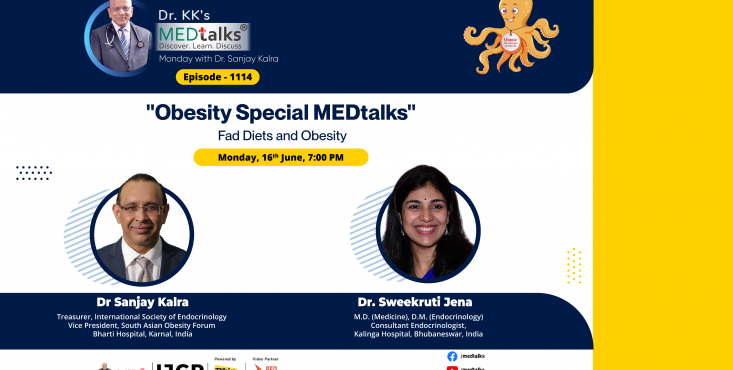
.jpg)
